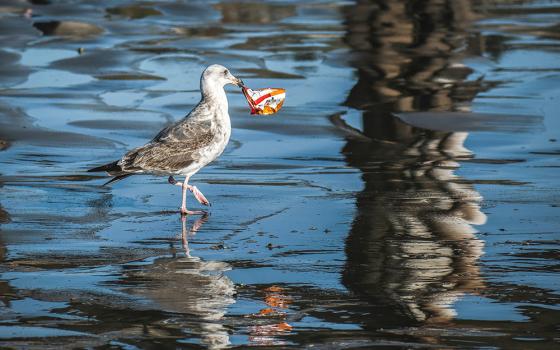
About a month before Proposition 8 passed in California Nov. 4, taking away an array of human rights, and the U.S. bishops decided to team up with the Knights of Columbus to make the “preservation of marriage” one of its key focuses for the next five years, my partner, Ariana, and I made our commitment to one another.
Our marriage was not "legal" by terms of the District of Columbia or the institutional Catholic church. Yet, in our eyes and in the eyes of our friends and family, our union is indeed holy.
As society has not yet defined the norms for our relationship the way it has for heterosexual couples, we had the freedom to be the architects of our own journey. And so, when Ariana and I initially realized that we were building a lifelong partnership, we had the opportunity to choose whether or not we needed or wanted a ceremony to mark our commitment.
After many discussions, we decided that not only did we want to have a wedding ceremony in order to express our love and commitment to each other in the presence of the Creator, our friends and our family, but we also wanted to take the year before the ritual to traverse through our version of a Pre-Cana marriage preparation program.
Our Pre-Cana was quite different from the Pre-Cana courses that many heterosexual couples go through kicking and screaming. Diann Neu, co-founder and co-director of the Women's Alliance for Theology, Ethics, and Religion (WATER), walked with us through the journey.
She challenged us with questions we had not thought to ask or were afraid to ask. We discussed everything: finances, children, fair fighting, spirituality and so on. We tackled the last-name debacle and settled on a combination of our mothers’ maiden names. We came to new levels of understanding -- and, sometimes, new levels of misunderstanding.
After we had journeyed through several months of our Pre-Cana, realizing that the work of communication would never be finished, we turned our focus to our ceremony. Diann helped us understand that we were the priests of our wedding. With great care, we crafted every moment of the ceremony to reflect a delicate balance of Ariana’s Unitarian Universalist tradition and my Catholic faith tradition.
We each chose a reading -- my pick was from the Book of Ruth, while her choice was Alice Walker’s “While Love Is Unfashionable.” The songs -- “Morning Has Broken,” “Water Is Wide” and “Swimming to the Other Side” -- each signified an important aspect of our relationship. With Diann’s expertise, we even managed to create a beautiful eucharistic prayer that was inclusive of our faiths and the faiths of all who celebrated with us.
In the end, we had a ceremony that was truly us.
 The year of preparation flew by and before we knew it our friends and family were arriving from all over the world for the affair. The ceremony, held at a local Swedenborgian church, was everything we had imagined it would be from the moment our families lit the candles to our tear-filled exchange of vows to the closing prayer when our family and friends raised their hands to bless us.
The year of preparation flew by and before we knew it our friends and family were arriving from all over the world for the affair. The ceremony, held at a local Swedenborgian church, was everything we had imagined it would be from the moment our families lit the candles to our tear-filled exchange of vows to the closing prayer when our family and friends raised their hands to bless us.
And, of course, no wedding would be complete without a party to follow. We led the parade of guests to a small restaurant around the corner for dinner. At the reception, folks shared songs and poetry, laughter and tears. From the deep holiness of the ceremony to the lighthearted humor and love of the reception, Ariana and I both felt blessed to have had the opportunity to marry one another surrounded by those closest to us.
In the days following our holy union, fully sated by our love and the love of our community, we did not necessarily feel any change in our relationship. For us, our marriage was and is about the journey, and the ceremony was one marker along the path. However, our story is just one of many. And surely, other stories will vary greatly, as what it means to be family comes in a multitude of shapes and sizes. Still, common themes will certainly arise — love, commitment, passion, devotion and so on.
Indeed, this past month has offered many challenges to the LGBTQ community and society at large. The institutional Catholic church and the state cannot take away our commitment to each other. However, as my legal right to marriage and family has been called into question, I have felt that attack on my life and the lives of my friends deeply.
My only hope is that these stumbling blocks on the road to justice will help open the dialogue, compel more people to tell their stories of love, and bring our church and our world closer to a discipleship of equals.
(Kate Childs Graham writes for ReligionDispatches.org and YoungAdultCatholics-Blog.com. She also serves on the Women’s Ordination Conference board of directors and the Call to Action Next Generation Leadership Team. )



